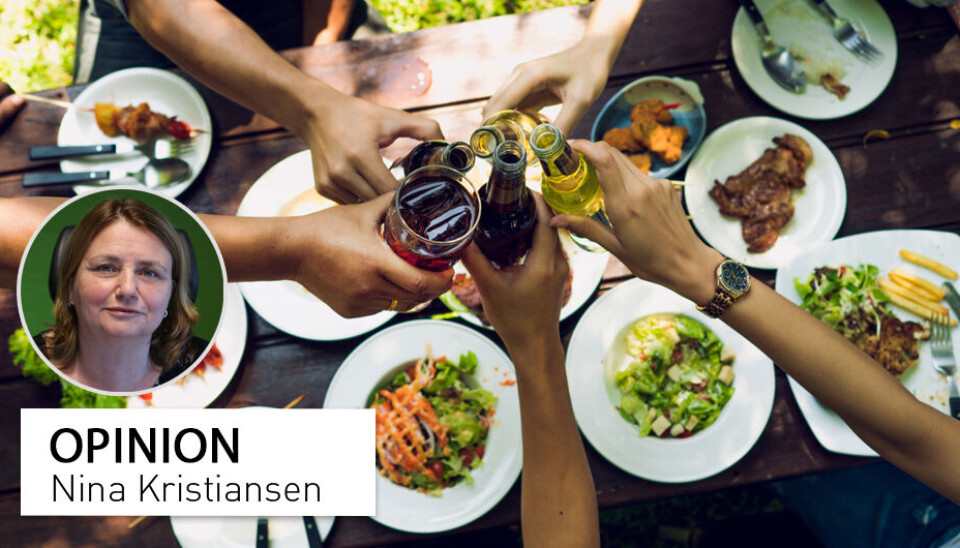
People in the Nordics are now advised to drink zero alcohol. Do dietary guidelines work if we cannot follow them?
OPINION: The dietary guidelines have had significant importance in Norway. They are something we know we should strive for. Now, most of us don't stand a chance.
Yesterday, new Nordic dietary guidelines were launched. Some of the recommendations will lead to significant changes in our diet if we follow them.
Others will impact our social life, such as the recommendation of zero alcohol.
The current advice from the Norwegian Directorate of Health is a maximum of 10 grams of alcohol per day for women, which is equivalent to a small glass of wine. For men, 20 grams is recommended.
400 Norwegian, Nordic, and international researchers have spent five years reviewing thousands of studies on foods, proteins, carbohydrates, vitamins, and alcohol. It has been ten years since the last review, so much of the research is new.
The researchers have not been able to find scientific evidence that any amount of alcohol is beneficial for our health. The glass of red wine that was once considered good for the heart is no longer so, according to the latest research.
Answer marked with double underscores
The work of the research group is similar to that behind the reports of the UN’s Intergovernmental Panel on Climate Change (IPCC). They have set criteria for what constitutes good research and have excluded poor, weak, and small studies. They have looked at new results and compared them with old ones. They have had disagreements but have sought a common answer. The result, i.e., the recommendations, is based on the overall picture.
It is rare for researchers to underline an answer, but they have done so here, just like they do with climate change.
And when the accumulated research indicates that zero alcohol is the best for our health, then that becomes their recommendation.
They have gone through the different food groups in a similar manner. Drink a maximum of four cups of coffee per day. Consume lean dairy products, up to 500 grams per day. Red meat: Here, we should reduce it to 350 grams per week. Instead of replacing red meat with white, they recommend fish, lentils, beans, and vegetables.
The report has received criticism, and the discussions will continue.
Disagreement about the selection of studies
Other researchers criticise the report because they believe that good, large, and/or important studies have been excluded. Perhaps there are studies they themselves rely on or have used in their research. Maybe they are their own studies.
Or they argue that weak studies have been included. Researchers do not always agree on what constitutes good scientific method or solid results.
Many with vested interests also criticise the new dietary guidelines.
For example, those involved in meat production. There are studies that exonerate red meat from health risks. Or they can refer to food traditions and the importance of livestock for self-sufficiency and cultural landscapes.
Nevertheless, the research group's review of numerous new studies indicates that red meat should be consumed in smaller quantities than what we currently eat. Public health takes precedence over meat producers and traditional foods.
Uncompromising recommendations
Others are sceptical about ultra-processed food and believe that guidelines against it should have been included. The research group, however, has not found research confirming that this type of food negatively affects health. They do mention a possible correlation but lack definitive research answers.
The research group's approach is research-driven and health-focused. They do not consider other factors beyond health and, in this instance, sustainability.
The research group follows the same path as the climate panels: You may like it or not, but the accumulated research speaks for itself.
There is respect to be had for professional advice and researchers who make no compromises.
However, this could lead to the dietary guidelines losing their status.
The dietary guidelines have had significant importance
They have been in place since 1954. Much research has been conducted since then, leading to multiple revisions. The last revision took place ten years ago.
The dietary guidelines have been the norm. They have defined what is considered healthy for us, even if we can’t recite them by heart or follow them every day.
What we have learned about food and health in school stems from the dietary guidelines. The food delivered to our elders at home or in nursing homes is based on the guidelines. The food served in hospitals and nurseries should adhere to the recommendations.
The dietary guidelines have had significant importance. They are something we know we should strive for.
Now, most of us don't stand a chance.
People won't stop drinking
Norway will not become teetotal.
Many of us could benefit from completely cutting out alcohol or drinking much less. Most of us drink occasionally or frequently but without alcohol problems.
If we are unsure if our intake is excessive, we can check with the authorities. What is their advice? Then we can try to align with that.
But even the most moderate individuals will violate the new alcohol recommendation.
Most of us have ambitions to eat healthier. Many want to drink less. However, only a small percentage of the population is teetotal or aspires to be so.
If the Norwegian Directorate of Health incorporates the Nordic recommendations of avoiding alcohol in their national dietary guidelines, most of us will go against them.
We trust the state in this country. When they expect something from us, we usually try to comply.
But when expectations are set that we cannot meet, everyone becomes dissatisfied. When you know you will lose, why should you try to play along?
The dietary guidelines have had high status in this country. Now, they may lose a significant amount of influence. That is not good for our health.
———
Translated by Alette Bjordal Gjellesvik.







































